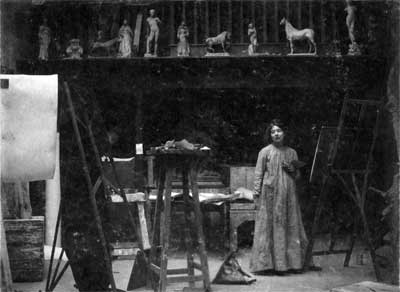 Sylvia Pankhurst the art student in her studio.
Sylvia Pankhurst the art student in her studio.
A sold-out annex theatre was treated to Jacqueline Mulhallen’s moving, informative and funny performance, Sylvia, the radical Suffragette leader
‘Sylvia’, Lynx Theatre; written and performed by Jacqueline Mulhallen; directed by William Alderson. Working Class Movement Library, Salford M5 4WX, 3rdof March 2018
Prior to Jacqueline appearing on to the stage as Sylvia Pankhurst, the slide show began, which provided both a commentary upon the action and on occasion a counterpoint to it. Jacqueline came out on to the stage and said hello to the audience, immediately breaking the fourth wall and creating the delightful impression that we were in the presence of Sylvia herself, appearing from history to tell us her story and, to a great extent, the story of women in Britain during her lifetime. Jacqueline’s warm performance style allowed the audience to feel that they were in good hands.
Sylvia then talked of her birth in London and her youth, including of course her return to Manchester, from where the Pankhursts hailed. Images of horse-drawn carriages and Victorian buildings accompanied this initial section of the play. These were then replaced by a mixture of historical and contemporary images, as Sylvia’s story moved from her time at the Manchester School of Art, to when she was in Venice as part of her Royal College of Art scholarship. This aided the audience in seeing Sylvia and the struggle for women’s equality as a continuing one, with her life and actions having relevance for audiences today.
Throughout, it was made clear that Sylvia did not just want to be an artist, nor just a female artist, but first and foremost a socialist artist. Her understanding of class, her involvement with the Independent Labour Party, and her lifelong activism were well documented on stage, allowing the audience to differentiate Sylvia’s struggle for women’s rights from her sister Christabel’s, whose Women’s Social and Political Union (WSPU) increasingly turned its attention to recruiting solely from the middle and upper classes. Moreover, Christabel and their mother Emmeline supported the British state in World War I, which Sylvia did not. The WSPU expelled Sylvia in 1914 and she founded the East London Federation of Suffragettes, which later became the Workers’ Socialist Federation. This context did not prevent the performance from discussing more broadly Sylvia’s love of painting, which was allowed to breath as a thing in itself, unfettered by political allegiance.
The play made use of occasional re-enactments and costume changes, such as the scene in which Sylvia meets Churchill. Also, Sylvia’s emotional life was brought into focus, for example in her discussion of her time at the Royal College of Art, where she was unhappy. More pleasing to her was her relationship with Keir Hardie, which was happily presented for the audience.
The play ended with the partial suffrage represented by the Representation of the People Act in 1918, which among other things gave women over thirty and with £5 of property in either their or their husband’s name, the right to vote. After a brief break to give Jacqueline the chance to change, there was a question and answer session, with a lively crowd that discussed the play, as well as other matters Pankhurst that were not covered dramatically, such as her anti-fascist campaigning and work in Ethiopia. Praise should also be given to the excellent and cheaply-priced programme, which provided a good summary of Sylvia’s life as political campaigner and artist, a poem, and information about Lynx Theatre and its members. Recommended.

